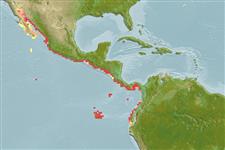Environment: milieu / climate zone / depth range / distribution range
Ecology
Marine; pelagic-neritic; depth range 0 - 50 m (Ref. 188). Tropical; 33°N - 5°S, 116°W - 77°W (Ref. 188)
Eastern Pacific: Gulf of California to the Gulf of Guayaquil.
Size / Weight / Age
Maturity: Lm ? range ? - ? cm
Max length : 15.9 cm TL male/unsexed; (Ref. 124487); common length : 10.0 cm SL male/unsexed; (Ref. 188); max. published weight: 34.85 g (Ref. 124487)
Dorsal spines (total): 0; Dorsal soft rays (total): 13 - 21; Anal spines: 0; Anal soft rays: 12 - 23. Body moderately slender, quite strongly compressed, belly sharply keeled. The bright silver stripe along the flank distinguishes it from all similar clupeids in the area. Hind border of gill opening evenly rounded (with two fleshy outgrowths in Harengula and Opisthonema, the latter with a filamentous last dorsal fin ray).
A coastal-pelagic species that forms dense schools in beaches, lagoons and estuaries (Ref. 9291). Tolerates brackish and fresh waters (Ref. 9291). Feeds on plankton, especially on small crustaceans and fish larvae (Ref. 9291). Processed into oil and fishmeal (Ref. 37955).
Life cycle and mating behavior
Maturity | Reproduction | Spawning | Eggs | Fecundity | Larvae
Whitehead, P.J.P., 1985. FAO Species Catalogue. Vol. 7. Clupeoid fishes of the world (suborder Clupeoidei). An annotated and illustrated catalogue of the herrings, sardines, pilchards, sprats, shads, anchovies and wolf-herrings. FAO Fish. Synop. 125(7/1):1-303. Rome: FAO. (Ref. 188)
IUCN Red List Status (Ref. 130435: Version 2024-1)
Threat to humans
Harmless
Human uses
Fisheries: minor commercial
Tools
Special reports
Download XML
Internet sources
Estimates based on models
Preferred temperature (Ref.
123201): 20.6 - 28.5, mean 25.6 °C (based on 58 cells).
Phylogenetic diversity index (Ref.
82804): PD
50 = 0.5625 [Uniqueness, from 0.5 = low to 2.0 = high].
Bayesian length-weight: a=0.00871 (0.00561 - 0.01351), b=3.11 (2.98 - 3.24), in cm total length, based on LWR estimates for this species & (Sub)family-body (Ref.
93245).
Trophic level (Ref.
69278): 3.5 ±0.43 se; based on food items.
Generation time: 0.8 ( na - na) years. Estimated as median ln(3)/K based on 1
growth studies.
Resilience (Ref.
120179): High, minimum population doubling time less than 15 months (K=1.36).
Fishing Vulnerability (Ref.
59153): Low vulnerability (10 of 100).
Nutrients (Ref.
124155): Calcium = 365 [180, 761] mg/100g; Iron = 2.75 [1.55, 4.72] mg/100g; Protein = 18.7 [17.6, 19.9] %; Omega3 = 0.44 [0.23, 0.82] g/100g; Selenium = 45 [21, 93] μg/100g; VitaminA = 31.1 [11.9, 83.4] μg/100g; Zinc = 1.77 [1.18, 2.68] mg/100g (wet weight);
